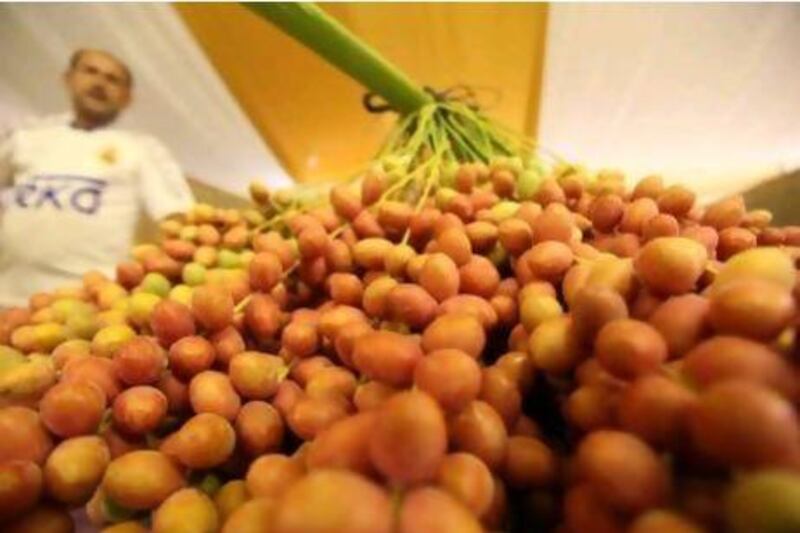Fresh dates from the UAE are filling supermarket shelves in Saudi Arabia and the United Kingdom.
The fruits are harvested in 300 farms in Abu Dhabi and marketed by the Abu Dhabi Farmers' Services Centre (ADFSC). A consignment of 11 tonnes, the second since the harvest started, left for Saudi Arabia last week. The move is the first of its kind for ADFSC, which is taking advantage of the fact that the fresh dates season starts later in Saudi than in the Emirates.
In the UK, where three shipments of about a tonne each have been sent since July 17, the dates are proving popular with Muslim customers, said Chris Hirst, the chief executive officer of ADFSC.
This is the first time that the centre, created by the Government to modernise the emirate's agriculture sector, has tried to market fresh dates.
"We decided this year to try, not in a large way, to investigate the market," said Mr Hirst. "It looks like it is going to be successful."
The fruit are also being marketed locally with two tonnes sent to supermarkets every day.
For Emiratis, the fresh dates harvest - from the end of May until September, depending on the variety - is a celebrated event every year.
"It is like a gift from God, it is something we appreciate very much," said Obaid Al Mazrouei, director of investment and promotion at the Western Region Development Council, who is also the project manager for the Liwa Date Festival, which ended on July 18.
Mr Al Mazrouei owns a farm with about 500 palm trees in Liwa. Growing the trees is "not complicated", he said. Yet, it does require knowledge, especially when it comes to cross-pollinating the male and female trees in late January and the beginning of February. A few months later, when the first dates are ready, they are shared with family and friends.
"I send dates to my family, friends, it is the best gift you can give at this time," said Mr Al Mazrouei.
Dates are so important in UAE tradition that Emiratis use five different words to describe them - kemri, khelal, bessir, rotab and tamr. Each signifies a different stage in the fruit's development.
Kemri refers to the first stage when the fruit grows from the size of a pea to nearly full size. In the next stage, Khelal, the fruit is biologically mature but too bitter for consumption. By the time the fruits are referred to as Bessir, they have reached their full colour - yellow or red - and some date varieties can be eaten. The last phase, Tamr, refers to the dried fruit handed out with Arabic coffee upon greeting or as dessert.
But in the weeks leading up to September, the most useful word of all will be Rotab, used to describe the soft, fresh dates now in season.
"Rotab has the most benefits for the body and is best for eating," said Dr Ismail Al Hosani, Abu Dhabi extension services section manager for ADFSC.
The fruit contains between 65 and 70 per cent water, as well as glucose and fructose, which give them their strong sweet taste and are nutritionally a better choice than dried dates.
"They contain a lot of good enzymes, more water and a smaller percentage of sugar," he said, adding to the list vitamins such as A, B6, C and K, as well as potassium, iron, zinc and other micro elements.
Those wishing to try fresh dates can choose from about 250 documented varieties. Of them, Nagal is the one ripens first - as early as the middle of May in Oman and the end of May in Abu Dhabi.
"It is a very early variety. It is the first variety," said Dr Al Hosani. "But when Barhi comes, nobody eats this [Nagal] anymore."
Barhi dates are yellow in colour and turn golden brown when fully ripe. They are known for their sweet taste. Khalas, also yellow and brown but usually larger with a more elongated shape, are also a popular variety and some say the tastiest. They are now in season.
Al Khinizi or Khanezi, red and black when fully ripe, is another popular variety as are Al Dabbas, Sukari, Shishi and Lulu.






